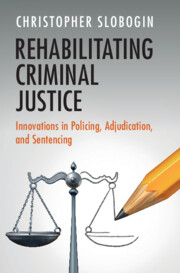Book contents
- Rehabilitating Criminal Justice
- Rehabilitating Criminal Justice
- Copyright page
- Contents
- Tables
- Preface
- Part I Policing
- 1 Equality in the Streets
- 2 Police ≠ Community Caretakers
- 3 Making Interrogation Transparent
- 4 Holding Police and Criminals Accountable
- Part II Adjudication
- Part III Post-conviction
- Notes
- Index
3 - Making Interrogation Transparent
from Part I - Policing
Published online by Cambridge University Press: 17 April 2025
- Rehabilitating Criminal Justice
- Rehabilitating Criminal Justice
- Copyright page
- Contents
- Tables
- Preface
- Part I Policing
- 1 Equality in the Streets
- 2 Police ≠ Community Caretakers
- 3 Making Interrogation Transparent
- 4 Holding Police and Criminals Accountable
- Part II Adjudication
- Part III Post-conviction
- Notes
- Index
Summary
Chapter 3 moves from street policing to interrogation. Numerous authors, from all points on the political spectrum, have advocated that police questioning of suspects be recorded. But police rarely tape custodial questioning, at least in full, and only a handful of courts have found this failure objectionable. In an effort to rejuvenate this debate, this chapter outlines three constitutional grounds for mandating that recording of interrogations become a routine practice. The first ground is based on the due process duty to preserve exculpatory evidence; although this argument has been raised before and has not fared well in the courts, it can be recast more persuasively and this chapter does so. The chapter then puts forward two new constitutional grounds for a taping requirement: the Fifth Amendment privilege against self-incrimination, with an emphasis on how it functioned in colonial times (when interrogations were carried out by judges, not police), and the Sixth Amendment right of confrontation, which guarantees the accused the right to challenge the state’s evidence. If one of these arguments can win the day, it will revolutionize the interrogation process much more radically than did Miranda v. Arizona and its warning requirement.
- Type
- Chapter
- Information
- Rehabilitating Criminal JusticeInnovations in Policing, Adjudication, and Sentencing, pp. 39 - 49Publisher: Cambridge University PressPrint publication year: 2025

